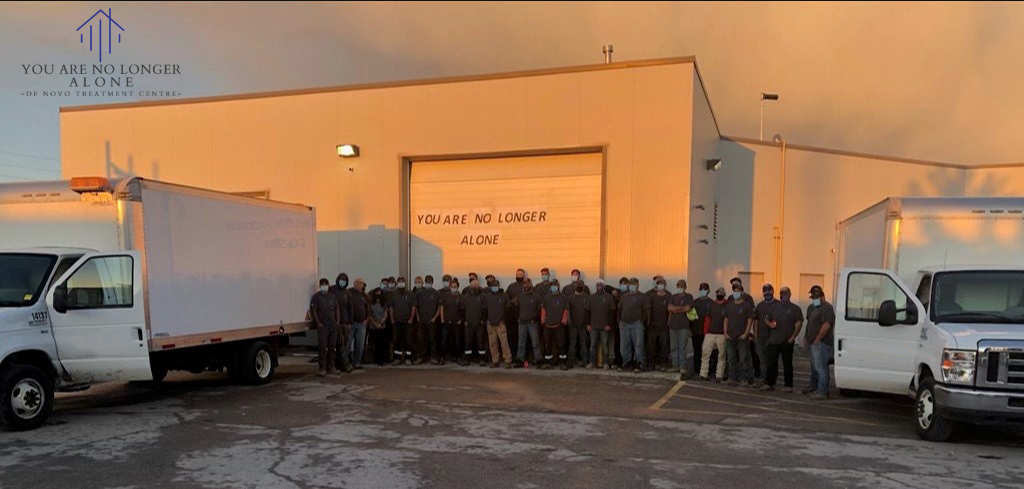
Mental health, suicide, and addiction issues have become increasingly prevalent in recent years, and amidst the COVID-19 pandemic, Canadians have been experiencing increased mental health concerns and substance use [1]. While many have been affected by this crisis, it has disproportionately impacted the construction and trades workforces.
Substance use and mental health concerns are critical issues for any industry in Canada. While research suggest these issues are common in all sectors, the risks are often higher within construction and trades industries [2].
You Are No Longer Alone was first inspired by members of Barrie UA Local 46, where individuals posted these words on their jobsite, for all to see. It represents standing up to combat addiction and mental health issues within the construction industry, where individuals struggling may often feel alone. De Novo was inspired by their actions and wanted to help re-create this act of solidary industry wide.
As the sole substance use treatment service to the construction and building trades of Ontario, De Novo Treatment Centre has firsthand seen the effects of the addiction and suicide crisis. In March of 2021, our research team set out to understand the causes and drivers of these issues within our industry. As a result, the You Are No Longer Alone resource hub was founded.
Our purpose is to shed light on substance use and mental health issues within the construction industry, by highlighting available, accessible, and effective supports. You Are No Longer Alone serves as a resource hub for national and provincial resources while also providing addiction, mental health, and suicide prevention education.
When it comes to mental health and addiction, many people may think they are long-term issues. In reality, the struggle can be a lot more temporary by seeking support. Mental health and addiction issues are all treatable, and they have the potential to be only temporary for most individuals.
Addiction and suicide prevention starts with educating yourself and others, understanding the gravity of the information, and coming together as a community to address the problem.
- Education: We recognize that education and continuous learning is essential to first understanding, then combating addiction and mental health issues. Learning changes minds and lives.
- Understanding: We believe in suspending judgment so that one can understand and appreciate others’ perspectives or situations when they are different from their own. When we try to understand one another, community forms.
- Community: We recognize that no single person or idea can solve complex challenges and believe that people working together can create greater impact than any one individual or organization can accomplish alone.
2024 RESEARCH
De Novo Treatment Centre is again working in partnership with the Provincial Building and Construction Trades Council of Ontario (PBCTCO) to conduct research in the construction industry. The current project seeks to further understand the impact of substance use and recovery on the families/friends of tradespeople. We are asking for your help! – by completing this survey, you will be helping De Novo to learn more about substance use and family support, as well as identify resources needed to support individuals struggling with addiction and their family members.
This survey will take around 10 minutes to complete, and it is completely anonymous and confidential – meaning there is no link to your personal information and no way to identify you. We kindly request all participants be truthful when answering these questions.
SURVEY LINK: Click here to go to the survey.
Thank you for your time and effort in helping us make a difference in the lives of individuals struggling with addiction, and their families. Please reach out to research@denovo.ca if you have any questions or concerns,
– De Novo Treatment Centre
Findings of ‘Causes and Drivers of Addiction and Suicide in the Trades’
As the sole substance use treatment service to the construction and building trades of Ontario, De Novo Treatment Centre has firsthand seen the effects of the addiction and suicide crisis. As a result, they wanted to better understand the drivers behind these issues. De Novo partnered with the Provincial Building and Construction Trades Council of Ontario and the Ontario Erectors Association, and along with market research firm Pollara Strategic Insights, they led research to better understand the causes and drivers of addiction and suicide among Ontario’s construction and building trades.
In total, online surveys were completed by 1267 participants from June 11, 2021 to July 25, 2021, consisting of the following populations:
- Members/employees of the building trades: 1011 respondents
- Leadership in the industry: 167 respondents
- Past De Novo clients: 78 respondents
Overall, the main reasons for substance use and suicidal ideation among construction workers were commonly expressed by all three population groups surveyed. After the results from all the surveys were analyzed, five key drivers emerged.
Work Habits and Schedule – 44%-49% of respondents
- Physical pain due to the kind of work involved;
- Long working hours;
- Not eating and/or living healthy;
- Working in shifts, not having a fixed sleeping pattern, trouble falling asleep, feeling tired, and low on energy.
Personal Relations – 45%-47% of respondents
- Staying away from home and/or family for extended periods of time;
- Living on the go, travelling a lot, staying in hotels, and not being able to spend enough time at home;
- Feeling unable to maintain relationships;
- Feeling isolated and cut off from family and friends;
- Not having anyone to talk to, feelings of being alone or lonely.
Mental Health: Stress, Anxiety and Depression – 40%-41% of respondents
- Work related stress;
- Feeling sad, depressed, or hopeless;
- Feeling anxious, restless, or uneasy;
- Stress, anxiety, and depression caused by other drivers (i.e. finances, personal relations, bullying, etc.).
Finances – 35%-44% of respondents
- Financial insecurity;
- Not being able to pay bills;
- Uncertainty about the next job, or getting the next job;
- Accepting jobs for the sake of having a job.
Discrimination and Abuse – 24%-26% of respondents
- Bullying by other members and/or the leaders;
- Getting abused physically, verbally, or mentally at the jobsite;
- Being of a different racial or ethnic background (being non-white), including speaking a different language and struggling in mixing with colleagues;
- LGBTQ2S+ members experiencing discrimination at higher rates;
- Being a woman in a male dominated industry – sexual harassment.
How to cite this data: De Novo Treatment Centre. (2021). Causes and drivers of addiction and suicide in the trades. Retrieved from www.youarenolongeralone.com
Did You know?
Nearly one-third of all opioid-related deaths in Ontario among those employed were from the construction industry [3]
Fact
By the time Canadians reach the age of 40, 1 in 2 have – or will have had – a mental illness [4]
Fact
People with a mental illness are twice as likely to have a substance use problem compared to the general population [5]
Fact
Studies show that stigma usually arises from lack of awareness, lack of education, lack of perception, and the nature and complications of the mental illness or issue [6]
Fact
50% of people experiencing an addiction say that being worried about what other people will think of them prevents them from seeking help [7]
You Are No Longer Alone
You Are No Longer Alone is an inspiring half hour documentary discussing the top five drivers of addiction and suicide in the construction industry identified by De Novo’s recent research project. The video features members and leaders in the trades who openly share their personal experiences and highlight positive changes to shift the culture to one of support. The documentary also provides an overview of the drug and alcohol treatment supports provided to the Ontario construction and building trades through De Novo Treatment Centre.
Virtual Resources
(click the box to view)
Breaking Free
- Breaking Free from Substance Use is an evidence-based digital behaviour change program that allows people to recognize and actively address the psychological and lifestyle issues that are driving their use of alcohol and/or drugs, so helping to support their recovery.
BounceBack
- BounceBack is a free skill-building program managed by the Canadian Mental Health Association (CMHA). It is designed to help adults and youth 15+ manage low mood, mild to moderate depression and anxiety, stress, or worry. Delivered over the phone with a coach and through online videos, you will get access to tools that will support you on your path to mental wellness.
Alcoholics Anonymous
- Alcoholics Anonymous (AA) is a fellowship of people who share their experience, strength, and hope with each other that they may solve their common problem and help others to recover from alcoholism. Using the Twelve Steps as a guide, AA’s primary purpose is to stay sober and help other alcoholics to achieve sobriety.
- Find a meeting near you: Find A.A. Near You | Alcoholics Anonymous (aa.org)
Narcotics Anonymous
- Narcotics Anonymous is a global, community-based organization that offers recovery from the effects of addiction through working a twelve-step program. The group atmosphere provides help from peers and offers an ongoing support network for addicts who wish to pursue and maintain a drug-free lifestyle.
- Find a meeting near you: Ontario NA – Meetings (orscna.org)
Everything AA App
- A free app that contains recovery-based readings, podcasts, and information – an excellent complement to your 12-step program! Available for iPhone and Android.
Hammer Time
- Hammer Time is a support group for people in the construction industry who are struggling with substance use issues, and may need access to recovery and/or harm reduction services. Meetings are a mix of education, discussion, and practical coping skills
- Hosted Thursdays at 7pm via the Zoom link
HeadsUpGuys
- An online, anonymous resource specifically designed for men, and their families, to prevent the continued erosion of men’s mental health and deaths by suicide. Their website offers tips and articles that arm men with the tools they need to fight depression, as well as recovery stories from men who have faced depression, and an international therapist directory to connect men with local mental health professionals
Wellness Together Canada
- Wellness Together Canada was created in response to an unprecedented rise in mental health and substance use concerns due to the COVID-19 pandemic. Their mission is to provide high-quality resources for all Canadians; from substance use support for older adults, to grief and loss counselling for youth.
- Immediate Crisis Support: text WELLNESS to 741741
Families for Addiction Recovery
- Parent-to-parent support group. FAR provides a safe virtual space where those concerned about a loved-one’s substance use can discuss practical strategies, find support, and share resources and information that worked for them. Participation in the groups is free and no registration is required
- Meetings are hosted on the 1st and 3rd Monday’s from 7-8:30pm, and the 1st and 3rd Tuesday’s from 12-1:30pm
Insight Timer App
- A free app that contains a variety of guided meditations to help reduce anxiety, improve sleep, or gain awareness. Available for iPhone and Android.
24/7 Resources
De Novo Treatment Centre: 1-800-933-6686
- De Novo Treatment Centre is an accredited alcohol and drug treatment service operated as a partnership between management and unionized members of Ontario’s construction trades.
- De Novo’s Treatment Team is available 24/7 for client support.
- denovo.ca
Talk Suicide Canada: 1-833-456-4566 or text 45645 between 4pm-midnight
- The Canada Suicide Prevention Service enables callers anywhere in Canada to access crisis support using the technology of their choice (phone, text, chat) in French or English
- Get Help | Talk Suicide Canada
First Nations and Inuit Hope for Wellness Line: 1-855-242-3310
- The Hope for Wellness Line offers immediate help to all Indigenous people across Canada. It’s available 24/7 for counselling and crisis intervention. Online chat available in English and French, and over-the-phone counselling available in English, French, Cree, Ojibway, and Inuktitut.
- Online chat: hopeforwellness.ca
National Overdose Response Service: 1-888-688-6677
- The National Overdose Response Service is an overdose prevention hotline for Canadians. They provide loving, confidential, and nonjudgemental support for you, whenever and wherever you need it.
- About — NATIONAL OVERDOSE RESPONSE SERVICE (NORS)
Kids Help Phone: 1-800-668-6868 or text CONNECT to 686868
- Canada’s national 24-hour, bilingual and anonymous phone counselling, web counselling, and referral service for children and youth. The service is completely anonymous and confidential.
- Get support with these mental health resources – Kids Help Phone
Trans Lifeline: 1-877-330-6366
- A non-profit dedicated to the well-being of transgender people. They run a hotline staffed by transgender people for transgender people. Trans Lifeline volunteers are ready to respond to whatever support needs members of their community might have.
- Trans Lifeline – Peer support services, hotline, and resources for transgender people.
Al-Anon/Alateen: 1-888-425-2666
- Al‑Anon is a mutual support program for family members of people who have a substance use condition. Alateen is a similar support group, mainly for teenagers or younger people.
- Find an Al-Anon or Alateen Face-to-Face, Phone, or Online Meeting
Families for Addiction Recovery: 1-855-377-6677
- Families helping families. FAR is a national charity founded by parents of children who have struggled with addiction from their teens
- Free Phone Support Line available at 1-855-377-6677 ext. 207; Mon-Fri from 1pm-3pm. You will be connected to one of their trained volunteers who understands those who have a child struggling with addiction, and are looking for support
- FAR Canada – Families for Addiction Recovery
COMING NOV. 30, 2023: 9-8-8 Mental Health Service
- A new three-digit number, 9-8-8, will be implemented on November 30th, 2023 for mental health and suicide prevention services. Call or text 9-8-8 from anywhere in Canada, and you will be connected to the appropriate mental health crisis or suicide prevention service in your area
- 9-8-8 number for mental health and suicide prevention | CRTC
Printable Resources
De Novo Treatment Centre Information [flyer]
- De Novo Treatment Centre is an accredited alcohol and drug treatment service operated as a partnership between management and unionized members of Ontario’s construction trades. Our mission is to provide the highest quality of substance abuse treatment for the employers and members within the unionized construction industry, and their families. The De Novo Treatment Centre Information flyers contains information about our programs and services. The flyer can be used both virtually and in print.
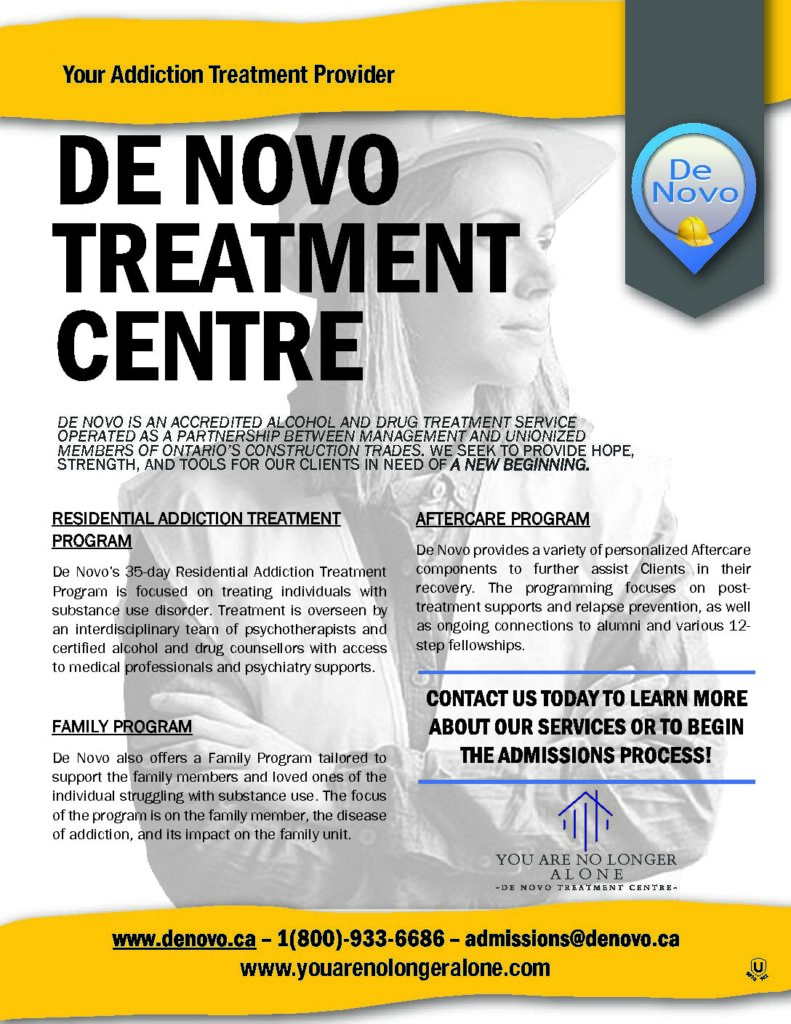
De Novo Info Flyer (01) 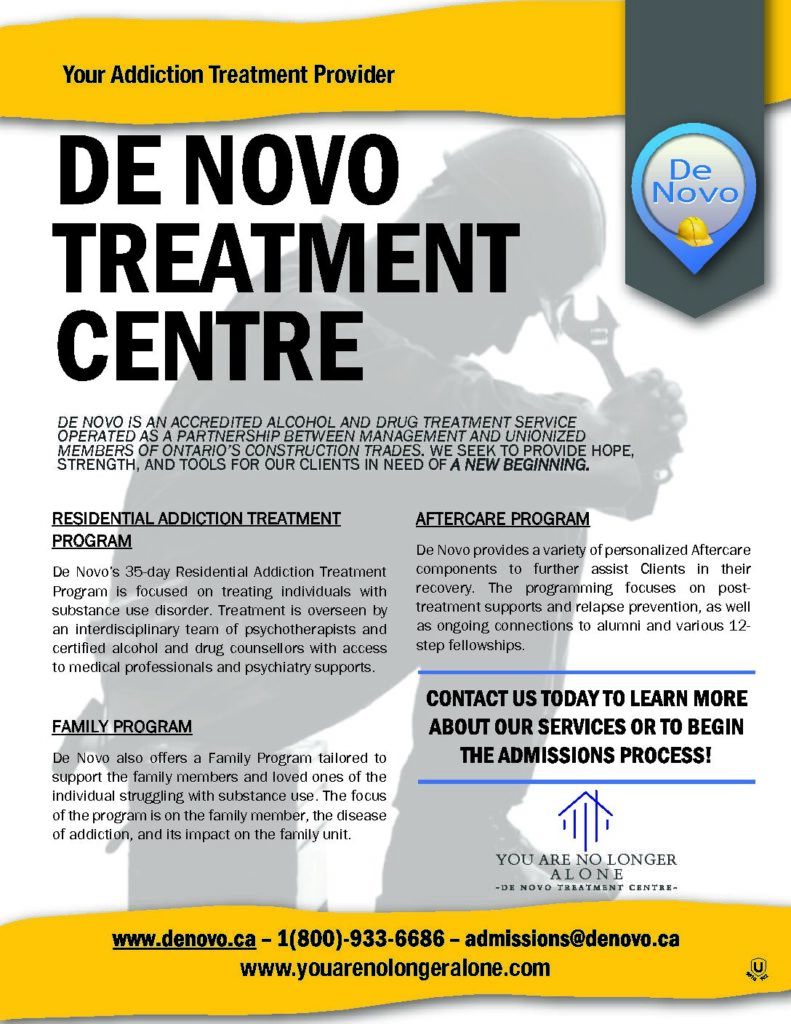
De Novo Info Flyer (02)
Signs and Symptoms Information [flyer]
- It can be difficult to know if someone is struggling with substance use or contemplating suicide. Knowing the signs and symptoms can help – prevention starts with education, understanding, and community. This flyer contains common signs and symptoms that may be experienced by an individual abusing substances or considering suicide. The flyer can be used both virtually and in print.
-
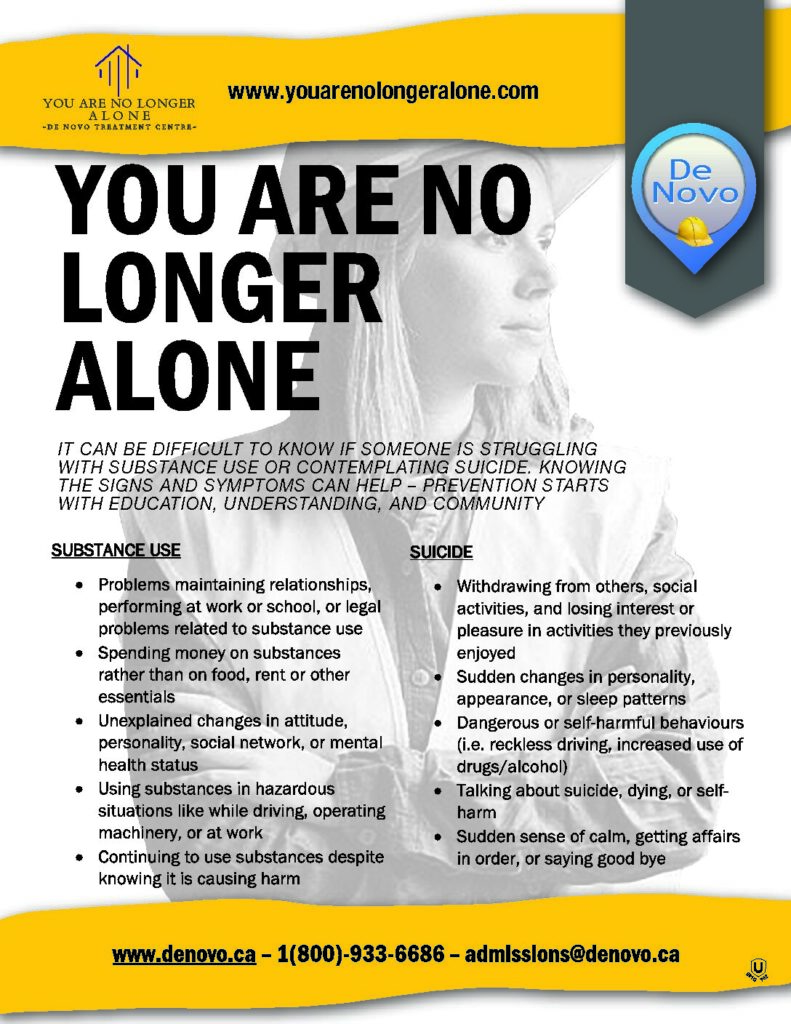
Signs and Symptoms Info Flyer (01) 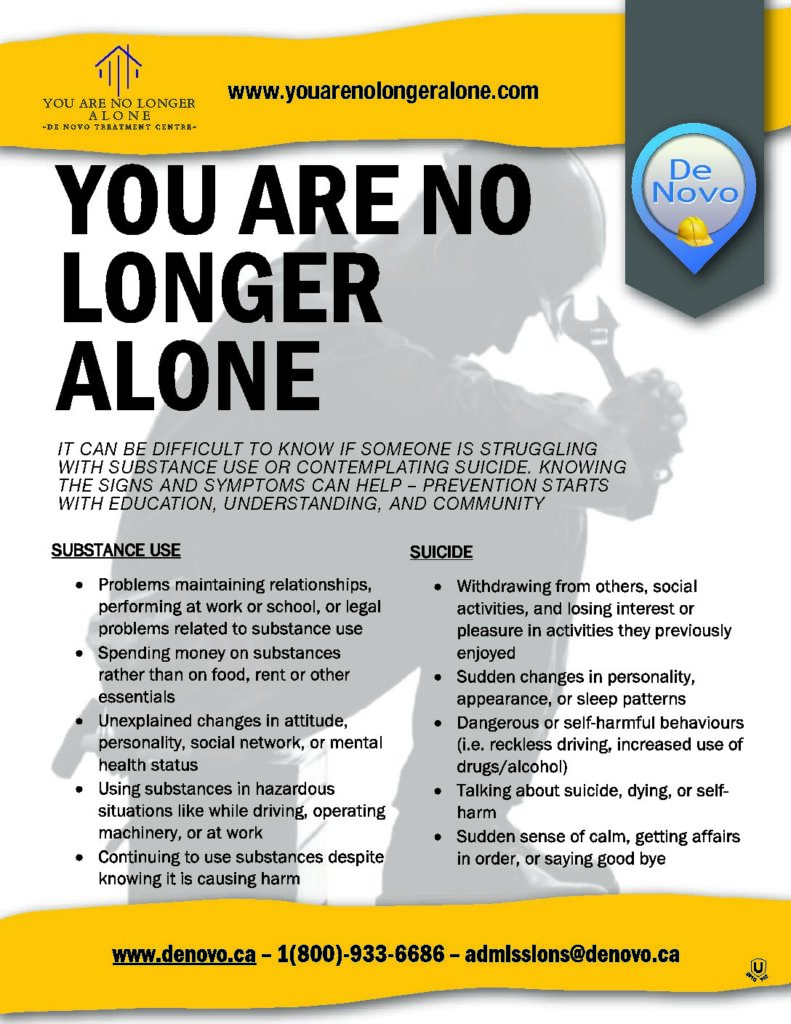
Signs and Symptoms Info Flyer (02)
Self-care Information [infographic]
- A resource from CAMH providing important information on self-care and examples of activities that can support overall health.
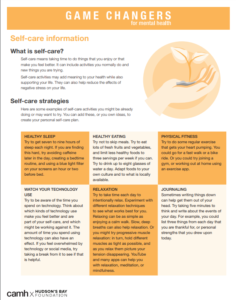
Download PDF
Talk About It [infographic]
- A resource from CAMH to help start a conversation about mental health.
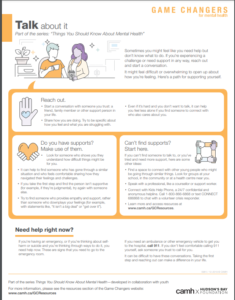
Download PDF
Coping with Stress, Anxiety, and Substance Use During Covid-19 [infographic]
- An overview of facts, tips, and resources from CCSA to help Canadians cope with stress, anxiety, and substance use during COVID-19. Topics covered include the signs and symptoms of anxiety or stress, and coping mechanisms like square breathing. Also includes advice on monitoring substance use in time of stress and reducing harms.
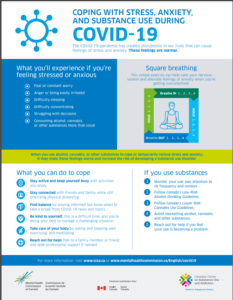
Download PDF
Virtual Care for Mental Health and Substance Use During Covid-19 [infographic]
- A poster from CCSA that provides information about accessing virtual care for substance use and mental health during COVID-19. It highlights the importance of seeking mental health and substance use care early, and provides a list of virtual care options that are available to offer support.
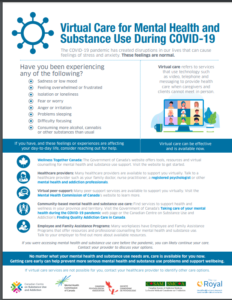
Download PDF
Supporting Someone Who May be Considering Suicide [infographic]
- A resource from CAMH to help start a conversation and support someone who may be considering suicide.
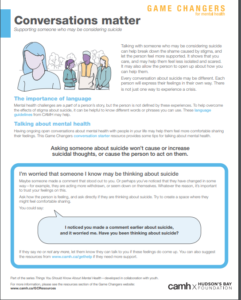
Download PDF
Citations
[1]: https://www.camh.ca/en/health-info/mental-health-and-covid-19/covid-19-national-survey
[2]: Vancouver Island Construction Association & Percival-Paterson, E. (2021). Tailgate toolkit: Stakeholder engagement summary 2021. Victoria, BC: Vancouver Island Construction Association and Island Health
[3]: Ontario Agency for Health Protection and Promotion (Public Health Ontario); Office of the Chief Coroner; Ontario Forensic Pathology Service & Ontario Drug Policy Research Network. (2019). Opioid mortality surveillance report: Analysis of opioid-related deaths in Ontario July 2017-June 2018. Toronto, ON: Queen’s Printer for Ontario.
[4]: Smetanin et al. (2011). The life and economic impact of major mental illnesses in Canada: 2011-2041. Prepared for the Mental Health Commission of Canada. Toronto: RiskAnalytica.
[5]: Rush et al. (2008). Prevalence of co-occurring substance use and other mental disorders in the Canadian population. Canadian Journal of Psychiatry, 53: 800-9.
[6]: Arboleda-Florez J. (2002). What causes stigma? World Psychiatry, 1:25–6.
[7]: McQuaid, R.J., Malik, A., Moussouni, K., Baydack, N., Stargardter, M., & Morrisey, M. (2017). Life in recovery from addiction in Canada. Ottawa, Ont.: Canadian Centre on Substance Use and Addiction.
De Novo Treatment Centre is not responsible for the accuracy or availability, nor does it endorse the resources or services posted on You Are No Longer Alone. The material contained on the You Are No Longer Alone website is for informational or educational purposes only. You Are No Longer Alone is not a direct service organization; it was developed by De Novo Treatment Centre as a ‘resource page’ for those seeking supports and services. If you need assistance, please contact the appropriate medical professional or qualified health provider.